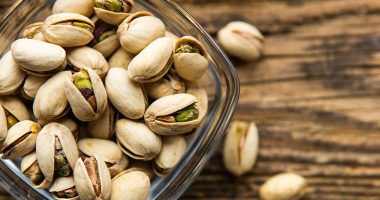While all four of these stress-soothing hormones are produced naturally by the body, melatonin stands out for one big reason: It’s more popular than ever in supplement form. Makes sense, as a variety of lifestyle factors can impede its production (and who doesn’t have issues falling or staying asleep these days?). And while you’re likely well-aware of melatonin as an alternative to prescription sleep aids, it’s important to note that it’s also naturally found in a number of foods.
What is melatonin, exactly?
As you might have guessed at this point, melatonin is a hormone produced in our brain. As light decreases, our levels of melatonin increase, helping us fall asleep. “While melatonin is best known for regulating our circadian rhythm, it also has antioxidant properties,” says Leila Page, RD, CLT at OC Nutrition Coaching. “The body makes melatonin on its own, however some individuals may benefit from taking additional melatonin, especially if they are having issues falling asleep.” (If you’re curious to see where your starting off point is, some integrative health professionals offer testing of melatonin levels.)
It’s important to note, however, that the body will process natural forms of melatonin—from foods, for example—very differently than melatonin in supplement form. “The impact of [melatonin-rich foods] on our internal melatonin levels varies with how much we eat, the time of the day we eat them, and whether we eat them in combination with anything else,” behavioral sleep specialist Carleara Weiss, PhD, sleep science advisor for Aeroflow Sleep. Nothing to be concerned about—there haven’t been any negative side effects observed in people consuming melatonin in food or drink form—but still good to keep this in mind when upping your intake of melatonin foods.
5 melatonin foods that may help you sleep
While there is still limited scientific research regarding exactly how much melatonin is found in particular foods, there are a few foods known to be particularly high in the hormone. Below, Page highlights five of the foods known to be among the highest in melatonin.
1. Tart cherry concentrate
Tart cherry concentrate is the super-charged version of tart cherry juice. Just two tablespoons of concentrate has the juice of over 60 cherries. Dawn Blatner, RD suggests creating a “natural jello shot” by mixing two tablespoons of tart cherry concentrate with a tablespoon of chia seeds and chilling the mixture in the fridge before downing it with your dessert.
2. Pistachios
“On average, the amount of melatoni present in pistachios is among the highest found in food at about 6.6 milligrams per one-ounce serving, or about 49 nuts,” Frances Largeman-Roth, RDN, author of Smoothies & Juices: Prevention Healing Kitchen, told Well+Good. “If you’re trying to test out pistachios for sleep, eat a serving—1/4 cup—an hour before bed. Do this each night for two weeks, and keep a sleep journal to track how it makes you feel, and whether you notice any difference in your ability to fall or stay asleep at night.”
An easy way to pack in pistachios is by making a batch of these honey nut bars, which were concocted by nutrition coach and Barry’s Bootcamp instructor, Sashah Handal. They were conceived as a morning pick-me-up, but work just as well as a cozy after-dinner dessert or late-night snack. Plus, they’re made with the exact amount of pistachios recommended for optimal snoozing.
3. Eggs
Eggs are one of the most versatile ingredients, which is why we love any breakfast-for-dinner recipe that celebrate eggs. You can also opt for something loaded with anti-inflammatory spices, like an Instant Pot egg biryani, to pack in your pre-slumber melatonin.
4. Milk
Finally, an excuse to make that turmeric-rich Golden Milk drink you’ve heard so much buzz about! Or you can keep it simple and pour yourself a simple good ‘ol glass of warm milk (nope, not an old wives’ tale). Note you’ll want to use cow’s milk as it contains the highest amounts of melatonin.
5. Salmon
From a salmon bowl to salmon curry to a simple olive oil and lemon glaze, there are so many easy and delicious ways to prepare salmon. Feeling lazy? Canned salmon is underrated.
Note on melatonin foods
“All of the aforementioned foods may help you sleep by increasing circulating melatonin levels in your body since consuming melatonin from food has been found in studies to be an effective option for improving sleep,” says Page. “With food very rich in melatonin, such as tart cherry concentrate and pistachios, you may feel an effect after just 30 minutes.”
If you’re still finding it hard to get one of these foods on a particular day, Page notes that melatonin supplements are non habit-forming, so they can be consumed as needed to support sleep and there are a wide range of doses that can be used to enhance sleep. “Some people may notice a difference by taking 0.5 mg before bed, while other individuals may need a higher dose, 5 mg for instance,” says Page. “Having one serving 30 to 60 minutes before bed can enhance sleep. I like Pink Stork’s melatonin gummies because they combine the hormone with passionflower, which is also known to support sleep.” This option has 2 mg of melatonin per serving.
That said, it’s always recommended starting with a food-first approach and then, if that doesn’t work, you may want to consider starting with a low dose of melatonin in supplement form and slowly working your way up. Note to always be sure to consult with a physician, dietitian, or sleep specialist first, as melatonin supplements can impact certain conditions and interact with some medications.






